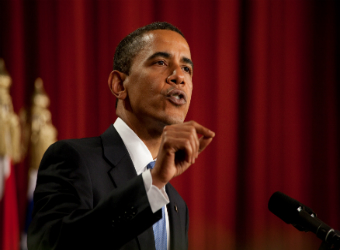Middle Eastern nations that desperately want to rid the region of Syrian President Bashar al-Assad have been notably muted as the United States pushes forward with plans for punitive military action against the Syrian government.
Despite throwing their own weight behind efforts to oust Assad — including by arming the Syrian rebels — key regional players such as Saudi Arabia and Qatar have held back from publicly endorsing any U.S. strike.
The silence reflects concern over a possible public backlash from open support for U.S. intervention. But given Washington’s relatively passive policy toward the Syrian conflict until now, U.S. allies in the region are also deeply skeptical that airstrikes will have any meaningful impact, analysts say.
“After 21 / 2 years of American administration hesitation with only verbal support and all talk, you can see the reservations in coming publicly and supporting American action when there is so much ambiguity over what that might be,” said Mustafa Alani, head of defense and security at the Gulf Research Center. “There’s a crisis of confidence between the Gulf and the American administration.”
Regional support became all the more important after a British U-turn Thursdayon participation in the strikes. Although U.S. officials have said they are willing to proceed even without the help of their closest ally, the loss of London’s support has made the absence of strong backing from Middle Eastern nations even more pronounced.
After an emergency meeting Tuesday, the Arab League released a statement that condemned last week’s suspected chemical weapons attack as a “heinous crime” and pointed the finger at the Syrian government. But the statement stopped short of backing military action in response.
The absence of a strong endorsement was unsurprising given the disparate opinions among the 22 members of the organization. But it was still a setback for a U.S. administration that has pledged to rebuild ties in the Islamic world by, among other things, working in concert with international institutions.
The Saudi foreign minister, Prince Saud al-Faisal, said this week that the “situation [in Syria] calls for a firm and serious attitude” to put an end to the civil war. But as one of the most stalwart supporters of the Syrian rebels, Saudi Arabia, along with Qatar, is likely to be pushing for more than what the United States has described as “limited and tailored” airstrikes, analysts said.
Officials in Riyadh and Doha are probably concerned that limited strikes could actually work in Assad’s favor, galvanizing his supporters to battle external aggression and allowing him to play the victor after strikes that the United States has made clear are not intended to topple him. Fears over a potential Iranian response to U.S. intervention are also holding Gulf nations back, analysts say.
The region is mindful, too, of the lessons of U.S. intervention in Iraq, where on Friday thousands of protesters in Baghdad and Basra carried placards reading “No to America.” Prime Minister Nouri al-Maliki also spoke out against military action, describing it as a “dead end” that would lead only to the destruction of Syria.
“Even though it was U.S. military action that brought the Iraq government into power, they aren’t backing it, which says something,” said Salman Shaikh, an analyst at the Brookings Doha Center.
For Iraq, as with Syria’s other neighbors, the endless flow of refugees is likely to be contributing to their unease with a possible widening of the war. Iraq, like Jordan, has said it has put its forces on a state of emergency, readied for the potential fallout from a strike.
In Amman, hundreds of Jordanians rallied Friday to protest the proposed Western airstrikes, denouncing the push for military intervention as a continuation of “American aggression” in Arab and Muslim countries.
The demonstration, led by Jordanian leftist and nationalist parties, drew about 1,000 people onto the streets of downtown Amman after noon prayers. Participants raised the flags of Syria and Hezbollah, the militant Lebanese Shiite group that is fighting alongside Assad’s forces, and chanted, “From Damascus to Amman, we are one people united against the American dogs.”
There is rising concern among Jordanians that military intervention will only exacerbate a conflict that has posed economic and security challenges to Jordan and has driven more than half a million Syrian refugees into the country.
“Like all of America’s wars in the Arab world, Jordan will pay the price if they attack Syria,” said Mohammed Hamour, a 22-year-old engineering student, as he hoisted a Syrian flag in the air. “Any military attack on Syria will be an attack on the safety, security and livelihood of the Jordanian people.”
For Egypt, military intervention could spark street protests and add to escalating anti-U.S. sentiment. On Thursday, Foreign Minister Nabil Fahmy said the country would “oppose it strongly.”
In Lebanon, where the nation is deeply divided over the Syrian issue, there are concerns that military strikes on Syria will bolster the influx of refugees or further destabilize security.
Among Syria’s immediate neighbors, that leaves just Turkey and Israel backing intervention.
“The U.S. strategy is just not convincing,” Shaikh said. “The U.S. haven’t had a long-term plan for Syria or the Middle East in general. Their chickens are coming home to roost.”
Source: The Washington Post



